Xihe's Young Women Pray for Wisdom, Good Fortune
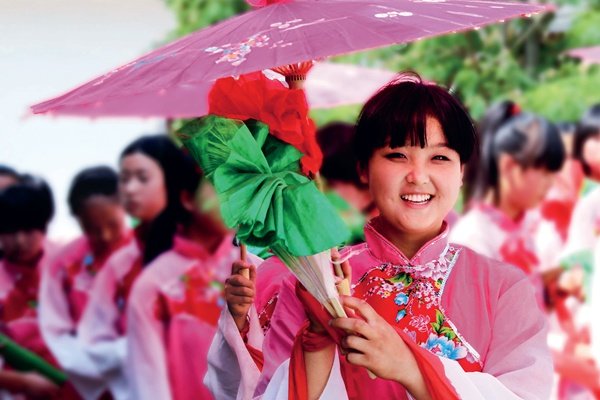 |
| Girls in Xihe, a county in Longnan, a city in Northwest China's Gansu Province, sing and dance to celebrate Qiqiao Festival. |
Young, unmarried women who live in Xihe, a county in Longnan, a city in Northwest China's Gansu Province, sing and dance to celebrate Qiqiao Festival (from the evening of the 30th day of the sixth lunar month to the seventh day of the seventh lunar month). During the festival, the women also pray to the Weaving Maid for happiness and good luck. Each also hopes the goddess will help her find "Prince Charming," and that the goddess will grant her a lively mind and a quick hand. The festival, which dates back more than 1,800 years, is referred to as the "living fossil" of the ancient Chinese Qiqiao culture (praying to the goddess for wisdom and good fortune). In June 2008, China added the festival to the list of the country's items of intangible cultural heritage.
Records indicate the Qiqiao Festival originated during the Han Dynasty (206 BC-220 AD). The festivities originated from the fairy tale about the Cowherd and the Weaving Maid. Legend has it the Cowherd was a young farmer, who had rescued a holy cow, and the Weaving Maid was the youngest granddaughter of the Queen Mother of the West. One day, the Weaving Maid and her six older sisters descended to Earth for a visit. While they bathed in a river, the holy cow persuaded the Cowherd to hide the clothes of the youngest woman — the most beautiful of the women — to prevent her from flying away. The cow predicted the woman would marry the Cowherd. After the young women played in the water for a while, they climbed onto the bank to get dressed. Startled by a noise, six of the women flew away, and they left their youngest sister behind. When the Cowherd appeared before the weaving maid, with her dress in his hands, the young woman smiled shyly. Her eyes were filled with tender affection. Eventually, the young couple got married, and they lived happily, and the Cowherd worked in the fields, and the Weaving Maid wove at home.
The Queen Mother of the West became enraged after she learned of the situation, and she forced her granddaughter to return to heaven. The Cowherd ran after them, but as he was about to catch up, the Queen Mother of the West used her silver hairpin to draw a line between her granddaughter and the Cowherd. A wide river appeared between the Cowherd and the Weaving Maid. The river, which Chinese called the "Silver River," became known in the West as the "Milky Way." As a result, the Cowherd and the Weaving Maid were separated. Touched by the couple's affection, magpies form a bridge over the Silver River on the seventh day of the seventh lunar month each year. That allows the couple to reunite.
According to the fairy tale, people named the two bright stars, opposite each other across the Milky Way, the Cowherd (Altair) and the Weaving Maid (Vega). Two less-bright stars flank Vega, and Chinese believe they are the couple's children. Chinese customarily watch the stars during Seventh Eve. Many young women (in Xihe) face Vega and pray to the goddess for happiness and good luck. Each hopes the goddess will help her find "Prince Charming," and grant her a lively mind and a quick hand. Some middle-aged and elderly women join the young women in praying that their families' members will stay safe and sound. Many women also pray their motherland will become increasingly prosperous, and more and more Chinese will live happy, fulfilled lives.
The Qiqiao Festival integrates Xihe's various artistic elements, such as poetry, music, dance and fine arts. Therefore, the festival has high historical and cultural value. Through the festivities, one may get a glimpse into local residents' religious beliefs and aesthetic tastes. The festivities also reveal Xihe women's desire to live better lives, and to achieve harmony between heaven, earth and man.
Xihe best retains the ancient customs of celebrating the festival. During the festival, young women in Xihe usually participate in the following activities:
Zuoqiao (Settling the Goddess's Statue): Every year around the festival, a warm, joyous atmosphere permeates Xihe, as the young women prepare for the happy event. They have a tight schedule, as they have to fulfill many tasks, including raising money to buy the materials for the festival, preparing splendid attire (for the festive occasion), practicing their singing and dancing, making wheaten foods (used as sacrificial offerings to the Weaving Maid), and making a paper statue of the goddess. As the women place the goddess's statue in a resident's house, the locals refer to the activity as "Zuoqiao (which literally means to 'settle the goddess');"
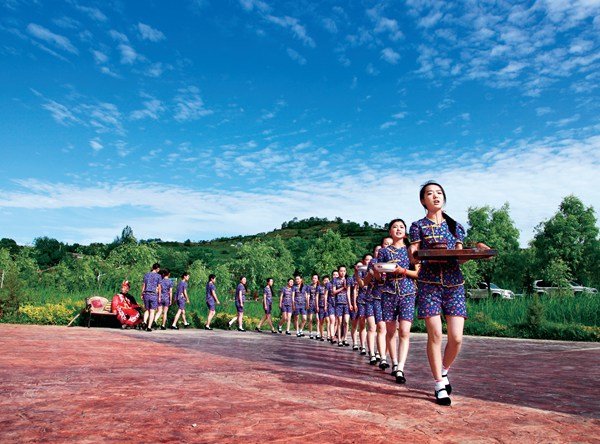 |
| Yingqiao (Greeting the Goddess) |
Yingqiao (Greeting the Goddess): Around 9 p.m. on the 30th day of the sixth lunar month, residents gather at a designated spot, generally at a crossroads in town or at an intersection, or by the riverside in the village. The young women, each in splendid clothes and holding a burning incense stick, lead residents to the designated place, where they offer sacrifices (to the goddess). Then, the residents sing to greet the goddess, while they hold their hands and swing their arms;
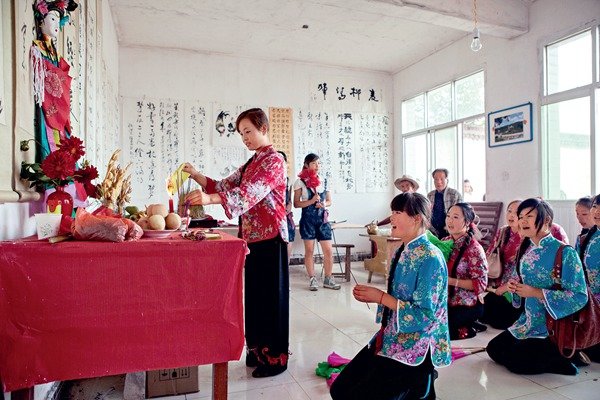 |
| Jiqiao (Offering Sacrifices to the Goddess) |
Jiqiao (Offering Sacrifices to the Goddess): During the festival, the women offer sacrifices to the goddess, both individually and collectively. Several women take turns lighting candles and incense, burning yellow paper (used for sacrifices) and worshipping the goddess, on bended knees, each morning, noon and evening daily during the festival;
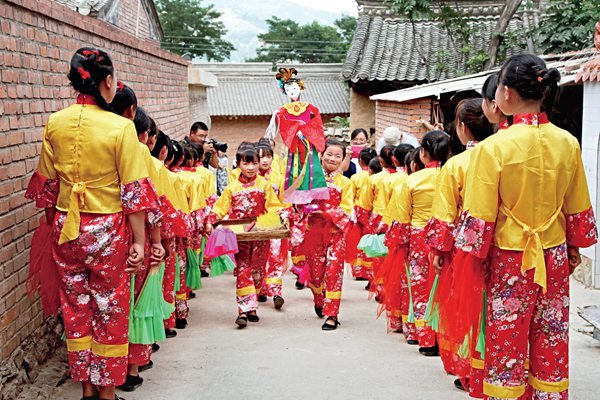 |
| Baiqiao (Sharing Experiences) |
Baiqiao (Sharing Experiences): After they worship the goddess, residents in the county's neighboring villages/areas visit each other to share their Qiqiao experiences. Many young women take delight in participating in the activity. They take the opportunity not only to make friends with women from other villages/areas, but also to take time to look for "Prince Charming;"
Yuqiao (Entertaining the Goddess): To entertain the goddess, the young women sing to her, from morning to late at night, each day during the seven days and eight nights of the festival;
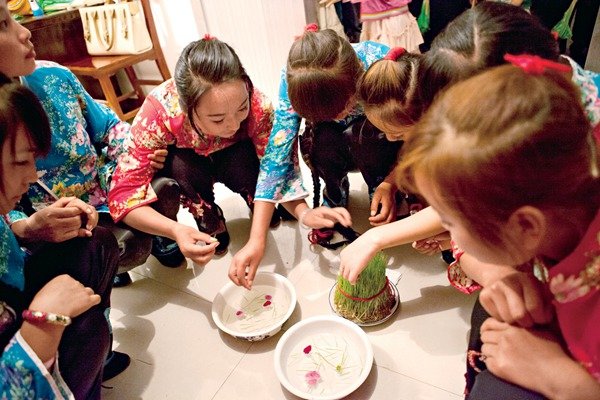 |
| Buqiao (Practicing Divination) |
Buqiao (Practicing Divination): The women hold the divining ceremony around 9 p.m. on the seventh day of the seventh lunar month. During the ceremony, each woman throws a bean sprout in water, and then she studies the shape of its reflection to see if the goddess has granted her wisdom; and
Songqiao (Bidding Farewell to the Goddess): At last, it is time for the women to say goodbye to their beloved goddess. The women who organized the Qiqiao activities will burn the paper statue of the goddess. The other women kneel and sing a farewell song to the goddess. When the goddess is gone, all of the women weep aloud. After that, they return to their homes.
In 2006, Chinese Folk Literature and Art Association named Xihe the "hometown of China's Qiqiao Culture." In a bid to protect and promote the time-honored folk culture, China added Xihe's Qiqiao Festival to the list of the country's items of intangible cultural heritage in 2008.
Photos Supplied by Xihe Women's Federation
(Women of China English Monthly October 2021 issue)
Please understand that womenofchina.cn,a non-profit, information-communication website, cannot reach every writer before using articles and images. For copyright issues, please contact us by emailing: website@womenofchina.cn. The articles published and opinions expressed on this website represent the opinions of writers and are not necessarily shared by womenofchina.cn.






.jpg)

 WeChat
WeChat Weibo
Weibo 京公网安备 11010102004314号
京公网安备 11010102004314号